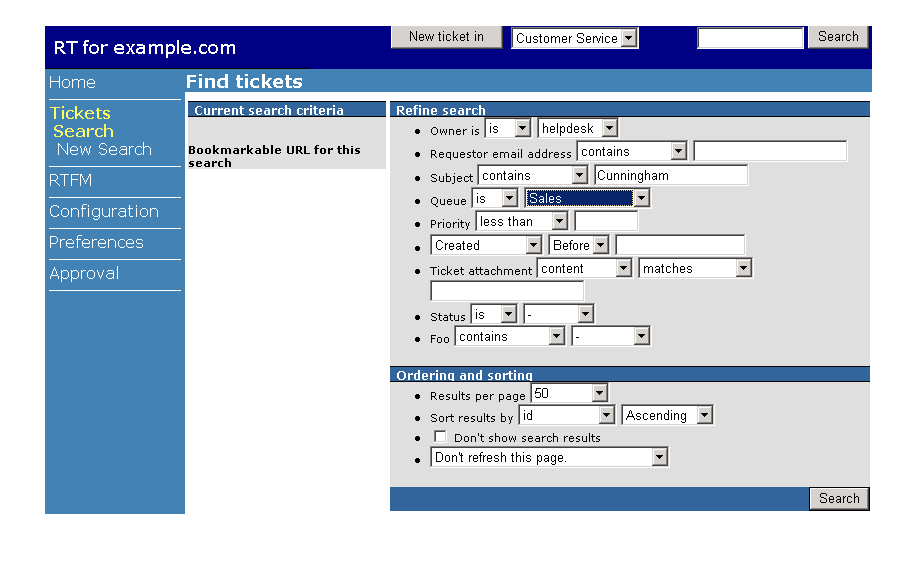![]() University | Computing
Services | Search | News | A-Z
Index | Contact Us
University | Computing
Services | Search | News | A-Z
Index | Contact Us



|
|
||
  |
Computing Services |  |
The search interface is available within every queue. Click Ticket -> New Search from the Left Hand navigation column to start a new search. One important point to be aware of is every ticket listing is a search of some description. The default search criteria set for every queue is to show all tickets matching:
for whichever queue you are viewing. The current search criteria is always listed under Current search criteria. In the example below current search criteria is blank as s no search has been requested.

Searching is pretty intuitive however there are some points worth noting:
The Time::ParseDate module allows for numerous time and date formats to be used in search criteria. This make it very easy to search for tickets relative to the current date and/or time.
Because we are UK based, UK style dates take precedence if there is a potential clash with USA style dates. All the following formats are valid date strings where:
dd = numeric day, mm = numeric month, yy = 2 digit year, yyyy = 4 digit year, mon = 3 char month, month = full name of month
Format |
Examples |
| dd/mm/yy | 1/11/03 |
| dd/mm/yyyy | 1/10/2003 |
| dd/mm (assumes current year) | 10/9 |
| dd mon | 5 jul |
| dd month yy | 7 july 03 |
| dd mon yyyy | 27 aug 2003 |
| mon dd | apr 26 |
| mon[th] dd{st, nd, rd, th} | october 10th, nov 17th |
We have units of 'days', 'weeks', 'months' and 'years' and a prefix action of 'last' or a numeric. Can also use 'now', 'today' and 'yesterday'. Postfix of 'ago' can also be used. Relative units are specific to the current time of day. So 'yesterday' means from this time yesterday.
| Format | Explanation | Examples |
| today | Current date and time | today |
| yesterday | previous 24 hour period | yesterday |
| last week | previous 7 day period | last week |
| last month | previous 31 day period | last month |
| last dow | last specified day of week | last monday, last thursday |
| nn days ago | previous nn days | 3 days ago, 12 days ago |
| - nn days | previous nn days | - 3 days, -12 days |
| nn weeks ago | previous nn weeks | 3 weeks ago |
| - nn weeks | previous nn weeks | - 2 weeks |
Times can also be treated in a similar fashion:
The format for absolute time specification is:
The format for relative time specification is the same as for date specification
Whenever a search is performed the parameters of the search are always listed in the Current Search Criteria field (see above). Individual search criteria can be deleted which will update the view of tickets accordingly.
Time and date searches always return the time in seconds since January 1st 1970 (known as epoch time). This is then converted into a readable date and time string and will be shown with the other search parameters in the Search Criteria field. If you have entered a time/date search parameter incorrectly then the result returned will be shown as 1970-01-01 00:00:00 GMT. If you get this simply delete and start again.
Date/time ranges can be searched in two stages. Specify one date to search from then search again for another date to search to. This will work because the searches are sticky.
The above examples will probably suit >95% of searches but Time::ParseDate does allow for other syntax. For full details of this refer to the documentation for Time::ParseDate on CPAN.